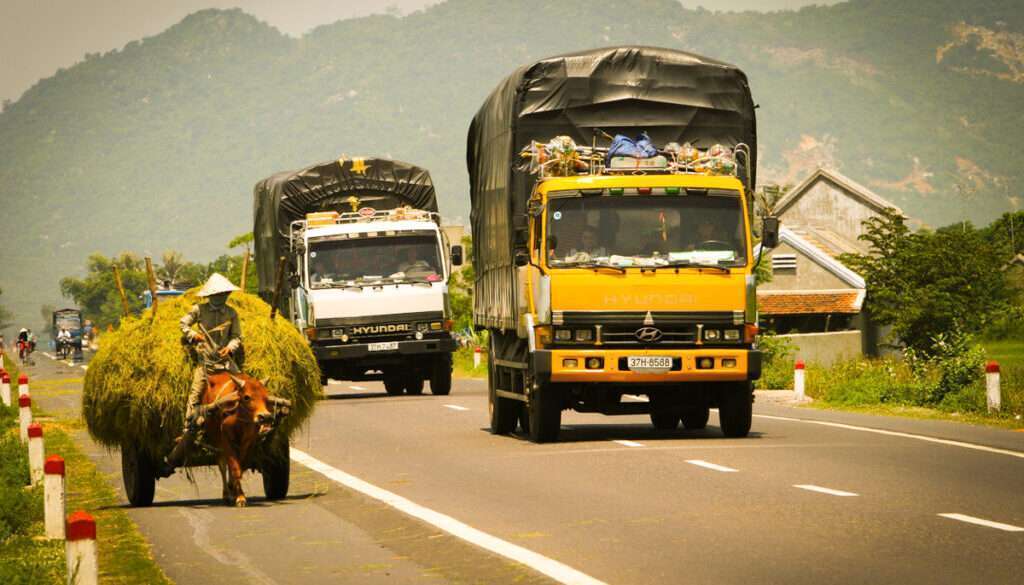
Enhancing transport connectivity is essential for social and economic growth since it gives opportunities for people to access basic services, education, and healthcare. It also opens up regional and national trade, job opportunities, and attracts more investment. However, there are many risk factors that can negatively affect the road network. In Vietnam, vehicle overloading—placing more weight on a vehicle than it can safely hold—is a major problem. Vehicle overloading damages roads and can lead to severe traffic accidents, air pollution, logistics disruption, and inefficient infrastructure investment.
Aus4Transport, a partnership program between the Australian Government and Government of Vietnam in the transport sector, supports the Vietnamese Ministry of Transport to ensure all matters of transport connectivity are addressed from different approaches and through a wide range of activities, in both engineering and non-engineering aspects.
Complementary to the Detailed Design and Documentation Activity for the Northern Mountain Provinces Transport Connectivity Project, Aus4Transport has just started a new activity, labelled Design of the Axle Load Control Program. This activity addresses vehicle overloading issues in the project area by providing specific measures to control vehicle load up to the maximum weight permitted on the road’s surface. The activity will provide support for identification and mitigation of the negative impacts of vehicle overloading, such as the deterioration of road pavement and bridges, and assist with increasing road safety, optimising its durability, and, overall, contributing to accelerate the economic, social-cultural, and environmental development of the region.
From the vehicle perspective, overloading, especially trucks, threatens road safety and increases air pollution. Not only does overloading reduce a vehicle’s service life, it also causes risks such as instability, stiff steering, and difficulty quickly slowing in case of a sudden emergency, which can lead to fatal road accidents. In addition, many studies have shown that excessive vehicle load remarkably increases fuel consumption and carbon emissions.
From a road infrastructure perspective, overloading practices are often underestimated as a real economic loss. However, a study carried out by the Asian Development Bank showed that efficient control on overloading vehicles could prevent millions of dollars of damage to Vietnamese roads. The study also revealed that generally, having weight control on a main road reduces potential damage by 50%, compared to no controls; and if better supervision and enforcement measures are in place, another 30% reduction can be achieved.
Current control measures save Vietnam US$120 million in damages, but unfortunately, trucks that have been modified to carry heavier loads are still operating in many provinces. This trend has increased during the pandemic.
According to a report from the Directorate for Roads of Vietnam, in 2019 10%, or nearly 19,000 trucks out of 181,000 trucks investigated, were carrying excessive weight. Many local to national roads in Vietnam have been seriously damaged since they were created. Lack of appropriate truck maintenance, driver awareness on overloading consequences, and efficient control measures including checking stations, appropriate weighbridges, and law enforcement, all contribute to this problem. Additionally, poor management from local authorities is also another factor that leads to inefficient control.
Aus4Tranport’s Design of the Axle Load Control Program will tackle these challenges and improve the regional connectivity and accessibility to the Greater Mekong Subregion corridors through safe and well-conditioned roads. The program will address overloading issues by proposing a mix of effective vehicle axle-load control policies, practices, and operational procedures. The control program has a long-term vision and is expected to be followed and applied in other projects across the country. The activity ensures compliance with national regulations and complements all existing measures based on the specific needs and requirements from local authorities and other stakeholders.
Specific tasks, which have already been approved by the Vietnamese Ministry of Transport, include a deep review of the current measures and practices, a reassessment of the current operational manuals, and the analysis of the Vietnamese legal framework related to vehicle overloading.
With the ease on the Covid-19 restrictions and the increase in travelling between regions and provinces in Vietnam, the Aus4Transport team has begun to conduct field trips to the provinces of Lao Cai, Lai Chau, and Yen Bai for close consultation with local authorities to collect all required data. Aus4Transport has nearly finished selecting the most appropriate types of weighbridges and identifying their optimal location along the project route. The Design Report is now being finalised and a workshop will be conducted towards the end of the activity to collect feedback and comments from all stakeholders before the submission of the final program design.
The program is a key element to enhance the transport network in the Northern Mountain provinces. It will optimise the road investment and support the growth of the regional economy, contributing to Aus4Transport main goal of supporting the socio-economic development of Vietnam and reducing poverty.